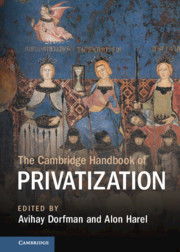
-
Select format
-
- Publisher:
- Cambridge University Press
- Publication date:
- August 2021
- September 2021
- ISBN:
- 9781108684330
- 9781108497145
- 9781009295703
- Dimensions:
- (254 x 178 mm)
- Weight & Pages:
- 0.78kg, 314 Pages
- Dimensions:
- (254 x 178 mm)
- Weight & Pages:
- 0.589kg, 313 Pages
- Series:
- Cambridge Law Handbooks
- Subjects:
- Law: General Interest, Law, Legal Philosophy, Philosophy, Jurisprudence
- Collection:
- Cambridge Law Handbooks
You may already have access via personal or institutional login- Series:
- Cambridge Law Handbooks
- Subjects:
- Law: General Interest, Law, Legal Philosophy, Philosophy, Jurisprudence
- Collection:
- Cambridge Law Handbooks
Book description
Some goods and services seem to be fundamentally public, such as legislation, criminal punishment, and fighting wars. By contrast, other functions, such as garbage collection, do not. This volume brings together prominent scholars from a range of academic fields - including law, economics, philosophy, and sociology - to address the core question of what makes a certain good or service fundamentally public and why. Sometimes, governments and other public entities are superior because they are more likely to get at the right decisions or follow fair procedures. In other instances, the provision of goods and services by public entities is intrinsically valuable. By analyzing the these answers, the authors also explore the nature of the state and its authority. This handbook explores influential arguments for and against privatization and also develops a number of key studies explaining, justifying, or challenging the legitimacy and the desirability of public provision of particular goods and services.
Contents
Metrics
Altmetric attention score
Full text views
Full text views help Loading metrics...
Loading metrics...
* Views captured on Cambridge Core between #date#. This data will be updated every 24 hours.
Usage data cannot currently be displayed.
Accessibility standard: Unknown
Why this information is here
This section outlines the accessibility features of this content - including support for screen readers, full keyboard navigation and high-contrast display options. This may not be relevant for you.
Accessibility Information
Accessibility compliance for the PDF of this book is currently unknown and may be updated in the future.


